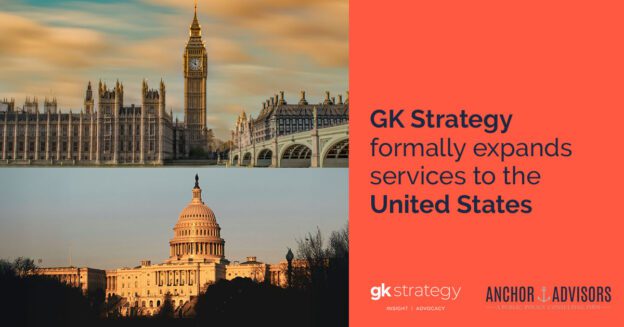See the recent publication from Ameresco, SDCL and 3Ci (hosted by Connected Places Catapult) below


See the recent publication from Ameresco, SDCL and 3Ci (hosted by Connected Places Catapult) below

GK has agreed a formal strategic partnership with Washington DC based Anchor Advisors to provide integrated insights for private equity investors navigating transatlantic M&A transactions.
GK Strategy is delighted to announce its formal expansion to the United States, to support its private-asset investor clients navigate and engage with policymaking at a federal and state level.
The partnership brings together GK Strategy’s deep expertise in the UK’s policy and regulatory environment with Anchor Advisors’ experience of supporting private equity investors navigate US policy at a state and federal level. The two firms will support private equity and private credit clients and their portfolio companies by providing robust insight to better anticipate regulatory change, assess political risk, and identify opportunities in both markets.
Louise Allen, CEO of GK Strategy said: “We’re delighted to announce the formal partnership between GK Strategy and Anchor Advisors. Private-asset investments are increasingly being shaped by fast-moving policy developments which have the potential to have significant impacts on the commercial environments for businesses operating in both the UK and the US.
Private equity and private credit firms, and the companies they own, are also increasingly looking beyond their traditional geographies to identify compelling investment opportunities, and to limit their exposure to any single region. GK’s partnership with Anchor Advisors means we can offer our clients a clear, connected perspective on how regulatory shifts in London and Washington could impact valuations, deal structures, and long-term strategies.”
Erin Caddell, President of Anchor Advisors, added: “Investors want certainty and foresight. Our partnership allows us to deliver precisely that, by providing clients with comprehensive analysis that spans both sides of the Atlantic, from opportunities presented by US federal and state government action to sector-specific funding trends.”
The partnership reflects a growing demand from private equity and private credit investors for tailored political and regulatory intelligence. By combining local insight with international perspective, GK Strategy and Anchor Advisors will support investors not only to mitigate risk but also to identify new growth opportunities in an increasingly complex global policy environment.
The new international advisory service will be led by Lizzie Wills, Senior Partner and Head of Private Equity at GK Strategy, and President of Anchor Advisors Erin Caddell.
For more information about GK’s US coverage, or to arrange an introductory meeting with the GK team in Washington D.C, please be in touch with Lizzie Wills on lizzie.wills@gkstrategy.com or 07456 794 568.

By Erin Caddell, Anchor Advisors LLC, in partnership with GK Strategy
Controversy surrounding the U.S. government’s aggregator of economics data has shone a spotlight on privately held firms that gather comparable information. Private economic data-collection firms are likely to enjoy policy-driven tailwinds amidst a period of questioning of the validity of government statistics and pressure on federal spending.
President Trump fired Bureau of Labor Statistics (BLS) Commissioner Erika McEnterfer in August after a monthly employment report announced downward revisions of U.S. jobs created in May and June of more than 250,000, plus a less-than-expected reading of 73,000 new jobs in July (BLS reported 5 September that 22,000 jobs had been created in August). Trump claimed the jobs numbers were “rigged” to undermine his Administration (Trump ramped up his broadsides further following a 9 September BLS report that lowered its estimates of job creation in the year ending March 2025 by more than 900,000, the largest such revision in its history).
Trump has nominated E.J. Antoni, a Trump loyalist, chief economist of the conservative Heritage Foundation and a BLS critic, to replace McEnterfer as the next Commissioner. Antoni has suggested that if confirmed he may temporarily suspend release of the monthly employment report to validate its methodology. Critics argue Antoni is unqualified since he has never worked in government, while his predecessor spent 20 years at the U.S. Census Bureau and Treasury Department prior to her appointment. Antoni’s detractors have argued further that an overtly partisan Commissioner would undermine public perception of BLS.
Private economic data-collection firms have an opportunity to benefit regardless of Antoni’s fate. If Antoni is confirmed, analysts will mine BLS’ data for signs of political bias. If rejected, the agency will face months without a confirmed leader. Regardless, any sustained run of reported job losses would surely draw further ire from Trump, ratcheting pressure on BLS further. Additionally, the next Commissioner will have to reckon with lower funding and staffing. The Trump Administration has recommended to Congress that BLS’s budget be cut by 8% in F2026, with staffing reduced to an 11-year low (shown below), though this recommendation is subject to Congressional approval. The controversy appears to have already hit BLS’ workforce, with some one-third of leadership positions at the agency reportedly vacant.
U.S. Bureau of Labor Statistics (BLS) – Congressional Appropriation and Headcount
| Fiscal year | Appropriation | FTEs |
| 2016 | 609,000 | 2,195 |
| 2017 | 609,000 | 2,185 |
| 2018 | 612,000 | 2,022 |
| 2019 | 605,000 | 2,057 |
| 2020 | 655,000 | 1,961 |
| 2021 | 655,000 | 1,965 |
| 2022 | 687,952 | 1,949 |
| 2023 | 697,952 | 2,023 |
| 2024 | 697,952 | 2,058 |
| 2025 | 703,952 | 2,019 |
| 2026E | 647,952 | 1,851 |
Source: U.S. Department of Labor. Note: F26E represents DOL’s recommendation to Congress.
Who to Watch
Several players appear positioned to leverage the opportunity to pick up the slack amidst concerns about validity of BLS data, including LinkUp, PriceStats and Yipitdata, as well as industry veterans ADP and Manpower.
LinkUp uses data sent directly by companies as well as publicly available information to provide analysis of national and local employment trends. LinkUp was acquired in November 2024 by GlobalData, a publicly traded U.K.-based firm (London stock ticker DATA). Lightcast provides a similar service, and last year was acquired by KKR. In the inflation arena, PriceStats is a self-funded firm founded in 2011, which uses public information to generate daily inflation reports in the U.S. and 24 other countries. Similarly, Yipitdata uses automated scans of millions of websites to assess changes in consumer behavior; Yipitdata raised $475m from Carlyle in 2021. Numerator is a startup that uses online surveys to help companies assess perceptions of their products and brands with consumers. While not exact parallels to BLS, these companies could reposition their businesses to more directly capture employment data.
The best-known alternative to the BLS is a monthly report produced by payroll administrator ADP. Similarly, staffing firm Manpower Group produces a quarterly survey on U.S. staffing trends. While less comprehensive than BLS’, there is an opportunity for ADP or Manpower to expand their data sets – and charge for the service – given the turmoil at BLS.
Historically, the federal government’s dominant place as the provider of U.S. economic data has made the notion of private-sector replacements seem woefully inadequate. Yet as with many developments in Trump’s second term, wishing for a “return to normal” is just that – a wish. The credibility of government economic data will continue to be questioned, while BLS’s funding and staffing pressures persist. The private sector has a clear opportunity to step in and fill the void.

Since the 2024 general election, Reform UK leader Nigel Farage has focused on shifting the perception that the party is a ‘one man band’. While Reform has outperformed both Labour and the Conservatives in the opinion polls throughout the summer, Farage is aware that there remain serious questions about whether his party is capable of governing effectively should it win the next general election.
On 5 September, as Reform kicked off the 2025 party conference season in Birmingham, it seemed as if the party had been successful in attracting much of the political media’s attention. This was a noticeable departure from previous years where Labour and Conservative conferences had dominated the news cycle.
The breaking news of a cabinet reshuffle following Angela Rayner’s resignation threatened to overshadow the first day of Reform’s conference. However, the party leadership spotted an opportunity to highlight the crisis that was enveloping the government and present Reform as a serious and professional alternative. As a result, Farage’s speech was pushed forward by three hours to ensure that he could be the first of Keir Starmer’s political opponents to react to Rayner’s departure from government.
Farage did not hold back, arguing that the government was ‘deep in crisis’ and was filled with people who were ‘wholly unqualified’ to run the country. He spoke of a Labour Party that was fractured and short of ideas, contrasting it with his own party, which he argued was ‘on the rise’. Farage claimed that Reform would be ready for any scenario, including an early general election. As a result, a new department would be established within the party focused on preparing for government. In addition to the new department, Farage said that the party would also prioritise the recruitment of experienced political operators – and used the opportunity to introduce former Culture Secretary Nadine Dorries to party members, following her defection from the Conservative Party.
Regarding its electoral strategy, Farage stated that Reform views the 2026 Scottish Parliament and Welsh Senedd elections as important opportunities, viewing them as an ’essential building block’ ahead of a general election. He added that Reform would aim to vet 5,000 candidates by next year to give itself the best chance of success in those elections.
Unsurprisingly, Farage did not make any detailed policy announcements, instead choosing to use his speech to energise Reform’s base. He told party members in attendance that if elected Reform would make cuts to the welfare system, scrap ‘harmful’ net zero policies, and stop small boats crossing the English Channel within two weeks of passing legislation. These pledges were also heard by business leaders, and lobbyists attending Reform’s conference for the first time – a sign that the party is now regarded as a serious contender. Reform also followed the example of the more established political parties by hosting fringe/policy events and business stands away from the main conference hall, further highlighting the party’s efforts to build new relationships with the UK’s business community.
Despite these efforts, Farage still needs greater message discipline from Reform members if he is to convince voters that the party is fully capable of running the country. During fringe events, orthodox policy conversations were disrupted by the sharing of conspiracy theories about international institutions and vaccines. Farage himself has also been keen to recreate the rambunctious energy of the Trump campaign rallies that he has attended at Reform’s events. As a result, there is a risk that unnecessary headlines will be generated by overeager and ill-disciplined speakers and attendees that could dent Reform’s attempts at professionalisation. Greater Lincolnshire Mayor Andrea Jenkyns singing a self-written song during her speech is unlikely to alleviate voters’ doubts that Reform has high quality politicians beyond Farage. Likewise, the decision to platform speakers like Lucy Connolly, who had been imprisoned for inciting racial hatred against asylum seekers, is also unlikely to endear the party to voters beyond its traditional base.
It is evident that Reform’s reputation has improved in recent years. However, YouGov polling from 4 September showed that voters still do not trust the party to deliver on key issues such as managing the economy, healthcare, housing, energy, and the cost of living. While the party conference was a small step in the right direction in terms of Reform’s establishment as a major threat to Labour and the Conservatives, it is clear that Nigel Farage still has work to do to professionalise the party and improve its standing on policy issues beyond immigration.

GK Strategy is pleased to share its guide to effective engagement with policymakers during party conference season.
Insight from the GK team on making the most of party conferences can be accessed here: https://gkstrategy.com/wp-content/uploads/2025/09/Engaging-at-Party-Conference-Season-GK-Strategy-September-2025.pdf

GK Strategy invites you to a webinar panel discussion on:
The National Food Strategy: the role of agri-tech in strengthening the UK’s food system
Keynote speakers:
Steve Brine
Strategic Adviser at GK Strategy and former health minister and chair of health and social care select committee
Honor May Eldridge
US and UK farming policy expert and former senior legislative advisor at the Food Standards Agency
Wednesday 22 October from 15:00 to 16:00
This event will held on Zoom.
Please RSVP by emailing events@gkstrategy.com for joining details.
Steve Brine is a Strategic Adviser at GK Strategy. He was Member of Parliament for Winchester from 2010-2024 and served in government as a Whip, public health minister and chaired the influential Health and Social Care Select Committee. Steve’s main interests include primary care, public health, NHS leadership and prevention of ill health as well as HIV, health tech and cancer. He also co-hosts the successful ‘Prevention is the new cure’ podcast and lives in Hampshire. He now works in the private sector as a health advisor and speaker and is a charity trustee.
Honor May Eldridge is a policy and advisory expert in food and environment impact, working to advise NGOs and businesses in the agriculture and food retail sectors. Her expertise spans international trade, climate-resilient agriculture, and food system transformation — always with an eye on equity and long-term viability. Honor was previously the Senior Legislative Advisor to the Food Standards Agency, working on how innovation can be delivered through regulation. She is currently working on two books on the future of food. She is also known for her wry appreciation of the avocado, having written her first book on the fruit that has, somewhat unfairly, borne the brunt of intergenerational debate. Once spotlighted as the unlikely culprit behind millennials’ housing woes, the avocado now serves as a symbol of Honor’s approach to food and farming policy: humble, misunderstood, and full of potential.